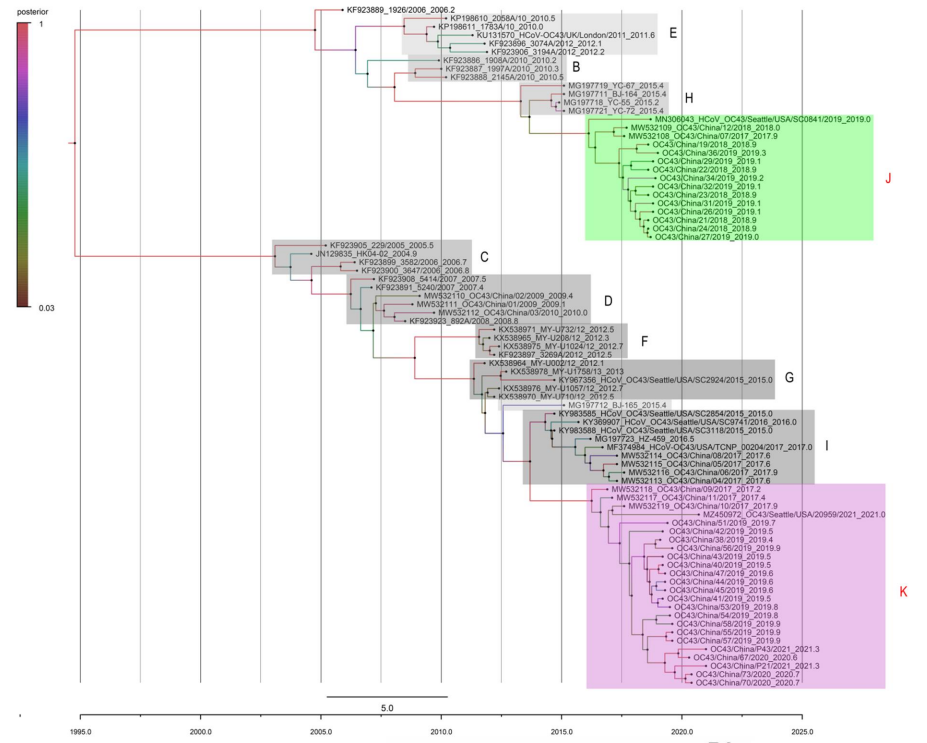The Team Led by Professor Zhao Jincun of SKLRD Discovers Novel Human Coronavirus OC43 Genotypes among Hospitalized Children
2021-12-251206The team led by Professor Zhao Jincun of SKLRD worked with organizations such as the team led by the research fellow Zhou Rong and Guangzhou Customs Technology Center to discover two novel human coronavirus OC43 genotypes among the hospitalized children with pneumonia in China and suggested stepping up the routine test for human respiratory system virus including low pathogenic coronavirus to prevent any epidemic caused by the novel genotype virus. The related paper “Two novel human coronavirus OC43 genotypes circulating in hospitalized children with pneumonia in China” was published on the journal “Emerging Microbes & Infections” in December 2021.

The occurrence of the Covid-19 has attracted public attention to the coronavirus. So far seven kinds of coronavirus that can infect humans have been discovered, including three highly pathogenic ones, SARS-CoV, MERS-CoV and SARS-CoV-2 and four low pathogenic ones, HCoV-OC43, HCoV-229E, HCoV-NL63 and HCoV-HKU1. Among them, HCoV-OC43 is the commonest coronavirus in the respiratory tract infection among the children and is considered as related with fetal encephalitis.
This research has covered 43 cases of children diagnosed as positive of HCoV-OC43 qPCR in the throat swab test. Most of the children have been clinically diagnosed as pneumonia, lobular pneumonia and acute bronchitis. The children ages between 1.6 months and 8 years. Meanwhile, their throat swabs have also been tested for other respiratory tract pathogens. Among the 43 cases, 60.5% have been infected with HCoV-OC43 only, while the remaining 39.5% have been infected concurrently. Through high-throughput sequencing, whole genome sequence of the HCoV-OC43 strain that has infected the children in the 43 cases has been acquired. An evolution analysis has been conducted on the whole genome sequence of HCoV-OC43 with the NCBI database. The results indicate that the newly acquired strain has formed two novel genotypes. According to the previous naming rules of HCoV-OC43, the new genotypes are named as Genotype J and Genotype K. The two new genotypes have relatively independent positions on the evolution tree, proving that the two have different evolution routes. A temporal evolution analysis was conducted on the HCoV-OC43 whole genome sequence that has been acquired and the results indicate that the common ancestor of the two genotypes may have appeared between 2014 and 2016. And it’s discovered that Genotype J originates from the recombination of Genotype H and I, while Genotype K has evolved from Genotype I.

HCoV-OC43 is endemic globally, which is related with common cold symptoms, but it may also cause a critical infection to the patients with immune deficiency and the infants. At present, there are relatively few researches on the genetic diversity and evolution of low pathogenic coronavirus and there are no vaccinations or specific therapies for them. The discovery of the two new genotypes among the hospitalized children of pneumonia indicates that we should strengthen the monitoring of human respiratory system pathogenic virus including the low pathogenic coronavirus.
















